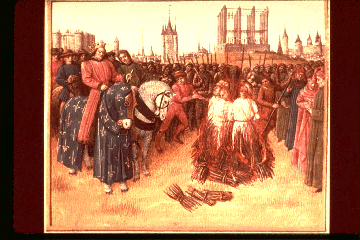
Reformers, Dissidents, and Heretics, 1200-1400

Reformists (12th century)
Main concerns: end of ecclesiastical corruption, attacks on church wealth, return to pure apostolic faith
Individuals must trust the "inspiration of the Holy Spirit"
Cathars (12th - 14th centuries): "the pure ones"
Location: southern France
Dualist system: 2 gods, one good (spirit) and one evil (body)
Evil god created the world and identified with god of the Hebrew Bible; rejection of Old Testament
Church, through its enslavement to material goods (sacraments and possessions) also an institution of the evil god
Rejection of earthly Jesus, sacramental system, all earthly images such as crosses and relics
Rejection of marriage and sex
Abstention from meat
Two groups: the perfecti or boni homines (leaders) and everyone else who obeys them
Crushed in the Albigensian Crusade (1208-1229) which results in the unification of France under Capetian kings
Inquisition established 1233 to mop up Cathar remnants
Defeat at Montsegur in 1243 (stuff of conspiracy legend)
Waldensians (Poor Men of Lyons)
Location: southern France
Peter Valdez, 1173 (urban merchant class)
Sold property and lived by begging; sought license to preach (refused by the papacy)
Initially attacked church wealth and corruption; believed laity should have the right to preach and interpret scripture
Condemned by Lucius III in 1184
Radicalized into attacking the church itself rather than its wealth or corruption